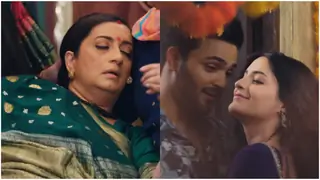| Ustad Bismillah Khan: Your tributes | |
Shyam Vyas, Morristown, NJ, ex UK I met Khan Sahib about 15 years ago and was immediately struck by his simplicity and modesty. He was unassuming and treated others with respect. His music reached out across caste and religious barriers so that both Muslims and Hindus can claim him as their own, much like Kabirdas-ji. Khan Sahib's life is testament to the fact that Muslims and Hindus can peacefully co-exist for the betterment of all. Chaitanya, Sunnyvale, CA At MIT in 1963 when I was the Secretary of the Indian Students' Association of Greater Boston, we had the privilege of hosting a performance of his in Kresge Auditorium. I remember the applause from a mainly American audience. But even more deeply imprinted in my memory was the charm of meeting a man who was completely unaffected in his ways. He was very attractive to observe. One could feel that through him some of the greatness of a tradition in art, and in humanity, was being passed on, impressionable and young, to welcome not only his music, but what he represented: the very best of the very best of what India had to give, first to its future sons and daughters, and then to the world, if it happened to be listening. Joe Cleetus, Kochi, India I heard Bismillah Khan in Berlin in Germany 15 years ago. I had very little knowledge of music and the shehnai. But the tune started changing my mood from within. Azfar Khan, Ohio, USA A sad day in the music world. A tragic event. We have lost the light; however we should be thankful to Allah for his life, his works and achievement. He touched the lives of millions, so may he be touched with eternal life. Ahmad Zahir, Toronto, Canada The sorrowful news of the death of the great and legendary Ustad Bismillah Khan is a great shock not only to every Indian citizen but also to every citizen of any country which feel himself or herself close to music. Nobody can fulfil the place which we find today empty by the death of Ustad Bismillah-ji. With deep sorrow, Kulvinder Singh, Rome - Italy How simple a life you lived yet what a great one it was! My heart bleeds every time I hear your music. You touched millions of hearts. Rest In Peace! Sayed, New York, USA He is a real ''jewel of India''. The country has lost a great musician as well a great person. Srinivas Krish, Kuwait Ustad Bismillah Khan lives through his music. An illustrious son of India, he epitomises the fact that we all are children of one God and can practice our faith while appreciating and respecting other faiths. In an era where there is so much strife, his life serves as an object lesson to all. May God Bless his soul. Siva T, Princeton,NJ A great individual like Ustad Bismillah Khan will never die if the memory of his thoughts and deeds are kept in our hearts and practised in our daily lives. Do as he did, think as he thought, and live as he lived. Only then would you show the respect deserving of this great man. May he rest in peace knowing he had made a difference to the people. Now it is up to the people to continue it. Andrew, Malaysia It's very sad news for music lovers. He was extraordinary during performances and assimilated other faiths and practices into his sweet being. Whatever he believed in order to enrich himself, is a lesson for our fellow countrymen. We respect him too, irrespective of our faiths and beliefs. B. Bhattacharyya, Bangalore, India It is truly a great loss to India and every Indian, regardless of their religion, is mourning the loss of Ustad Bismillah Khan. I fell in love with Bismillah Khan's music at a very young age. It was due to my father's respect for the maestro's music, jolly personality and secular character. Let me also share a great story with you all. Mr. Khan played at the reception of the gold- medal winning Indian hockey team in Jalandhar in 1964, which was attended by my uncle and father as his guests. Mr. Khan played in Jalanadhar every year during the Harballabh Music Festival. I had the opportunity to see him play live many a time. I will miss him dearly but his music will live on and entertain us forever. Pankaj Bhanot, Honolulu, Hawaii, USA I am shocked at the death of Indian music legend Ustad Bismillah Khan. He was not only the Indian musician but also all over the world. It's a great loss for world music. He also enthralled the Bangladeshi audience by his wonderful rendition of shehnai. He will be alive in our hearts always. Nasima Akhter Shoma, Dhaka, Bangladesh When I was a child Afghanistan National TV broadcast one of Bismillah Khan's plays on TV, and it was a wonderful and tremendously fantastic play. May Allah rest his soul in Paradise. We will remember this legendary man. D. M. Nazim, Kabul, Afghanistan Amazing musician. I had the great fortune of attending one of his concerts and the many notes he played still ring in my ears. How can I ever forget the "Bhimpalas" raga he magically wove. I feel terribly sad at his demise but all good things must come to an end as they say. May the great maestro's soul rest in peace. Arun, Seattle,USA It is proved once again that music does not carry any colour, creed or caste. The world would be a better place if music would be taught at every stage of education of all people and be cherished throughout the life. Love of music is natural, only taboos keep many societies from its true blessings. Dr. Kalam A. Mir, Kingston, Canada As a child I heard Ustad Bismillah Khan Sahib in 1962 at the All India Radio (A.I.R.) in New Delhi where he was performing live at the "Akhil Bhartiya Sangeet Sammelan". My sister who was younger than me, and I sneaked into the festival using the entry passes issued to my father, who was a poet and producer of Urdu programs, and was working at the A.I.R. It was hard for us to appreciate classical vocal Hindustani singing at the Music Festival but when Ustad Bismillah Khan started playing I really loved the melody from "Shehnaii". May God bless his soul. Dr. Shahid Siddiqui, Chicago I conduct a religious radio programme on Hinduism called "Pranav Vani Bhakti Devotions" in Toronto, Canada and the theme music I selected is the Shehnai by Ustad Bismmillah Khan. At 6.00 in the morning the soothing and divine sounds of the Shenai reach into tens of thousands of homes in Toronto. Ustad Mismillah Khan was an institution himself in the rich Art of shehnai music. He will be greatly missed as much as he belonged to India he also belonged to the world as his music represented the universal language of peace and harmony amongst mankind promoting religious tolerance. Swami Bhajanananda, Toronto, Canada Bismillah Khan is one of the people I have admired most, as much for his music as his life style. Unlike, most of the other musicians of his era, he did not make much money. His music plays the devil with my emotions. His music makes me cry and also makes me happy. He had magic in his fingers. |




























